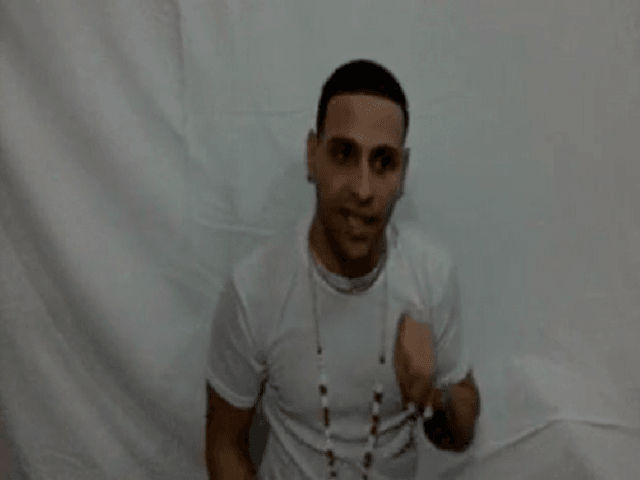A dissident reggaetón artist imprisoned after a Cuban government agent attacked him while using the internet has been placed in solitary confinement in prison and refused to eat or drink water for one week, his mother told the Miami-based news outlet Martí Noticias this week.
Henry Laso has adopted the Caribbean dance music genre as a medium of protest, publishing songs against dictator Raúl Castro and his late brother Fidel on YouTube and other social media before his arrest.
Mother Carmen Susana Martínez Álvarez told Martí that she has not been able to see her son for over a week and is not sure why he is being isolated within prison.
“It was not possible for me to see him [on Wednesday] because he had a disciplinary measure imposed,” she said communist law enforcement authorities told her. “He is in a punishment holding cell, scheduled to get out on the 16.”
“Everything indicates that he had problems with the prison warden,” she added, noting that he refused “water and food” for a week but had given up on the hunger strike due to health reasons. His father, Pedro Lazo, told Martí that he was behind bars for “a confrontation he had with an intelligence official on the street because of an accusation he made on the internet against this individual.”
Laso said his son “made the mistake of allowing them to provoke him” and was arrested after a group of police beat him into submission.
A week before his parents accused the government of locking him in solitary confinement, the Spain-based Diario de Cuba reported that he had been placed in a “punishment” cell for demanding medical attention after the beating that occured when he was arrested.
Laso has a long history of outspoken resistance to communism. Laso was arrested in February after a Cuban government official confronted him about using public WiFi—a luxury in Cuba which the government closely guards from anyone who may use it for political expression. Diario de Cuba reported about the arrest that Lazo used a knife to defend himself before being attacked by a mob of law enforcement officials. In Cuba, “police” officers often wear plain clothes and operate in large numbers, prepared to violently attack dissidents before their arrest.
Prior to that, Diario de Cuba notes that Laso was arrested on charges of “disrespect” (desacato)—a crime in Cuba—for publishing a hip-hop song on the internet about Fidel Castro. The song, titled “The False King,” attacks Castro for lying about being a communist (the song samples a soundbite of Castro saying “I am not a communist” in English) and destroying the future of Cuba’s youth.
“You lied to me, you faked it and you betrayed me,” he says in the lyrics. “I wanted to be your friend, I wanted to admire you, but you failed.”
“You told the Cuban people this revolution was by the people and for the people,” he continues, clarifying that the song is directed at Castro, saying, “The only traitor in Cuba is named Fidel Alejandro Castro Ruz.”
The song was posted on YouTube in January.
In other songs, Laso also berates the Castro regime for “paying miserable salaries” and “selling socialism while the inequality can be seen daily,” in videos holding up an image of Jesus.
Laso’s lyrics intensified in opposition to the government after he revealed that Cuban officials demand bribes from musicians who want their work to be verified by the government. Cuban communist officials must approve all music before it is played on radio or television. After a campaign in which he rallied other musicians to protest, he was temporarily allowed to return to music in February 2017, but by then used his license to write songs against the regime.
By October, the regime had once again moved to silence him. Laso denounced the Cuban regime that month after bizarre posts began surfacing on his social media accounts, some embarrassing him stating, in first person, that he had “embraced revolutionary principles,” and others by publishing pornographic materials that he had made privately with a partner. Publishing pornography on Facebook is both illegal under Cuban law and a violation of Facebook’s terms of service, which could result in him losing his music followers and ties to anti-Castro organizations that he had contacted. Laso told Cubanet that he believed the Cuban government was attempting to smear him for his anti-Castro videos.
“They changed my Facebook password, they took over my YouTube account, and right now I can’t access my Gmail,” he lamented at the time.
Cuba’s government agency controlling music, the Cuban Institute of Music, has branded Laso a “counterrevolutionary,” barring music industry officials from working with him.
The institute forces all artists to conform to strict guidelines, even those with a traditionally pro-Castro bent. The regime began to crack down on reggaetón specifically in 2012, as it grew in popularity on the island, due to its apolitical and often sexually explicit nature. The head of the Music Institute, Orlando Vistel, announced that year that Havana had begun the process of “eradicating any practice that is … not in accordance with legitimate Cuban popular culture.” Reggaetón, a genre that originated in Panama and is most popular in the United States in its Puerto Rican form, was identified as a “foreign trend” that threatened “revolutionary” culture.
The Cuban revolution has banned suggestive and, more importantly, non-political music from the island since its inception, when Fidel Castro denounced Elvis Presley and the Rolling Stones as cancerous influences on communist ideology.

COMMENTS
Please let us know if you're having issues with commenting.